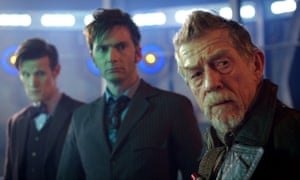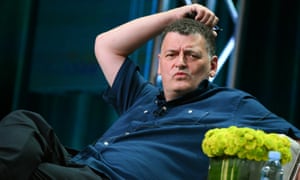Seven years ago, “hes taking” on the most severe task in TV. As the showrunner takes his last regular journey in the Tardis, we look back at his time on the fantasy favourite from brain-twisting plots to genius collaborations

With that shocking opening sequence of the regeneration of the 12 th Doctor, and the destiny of Bill Potts hanging in the balance, last weeks episode of Doctor Who left lots of unanswered questions. But we know one thing for sure: Saturdays season finale, The Doctor Falls, will be the last episode of a regular series with Steven Moffat at the helm. While we wait to find out how the Doctor will escape, and who he or she will be next, its the perfect opportunity to assess Moffats seven years running the show.
Moffat had a task like no other. In the 1960 s, 70 s and 80 s, producers and script editors came and moved. But nobody had the cast-iron clutch of both showrunning and writing that Russell T Davies did when the BBC resuscitated the show in 2005. The new Doctor Who was very much Davies vision and Moffat was the first person to step into those shoes.
Having written several stand-out episodes of the Davies era, anticipation was high. And it was a bright start: The Eleventh Hour remains one of the most significant introductions to Doctor Who. After virtually five decades as a teatime prove is targeted at families, we were introduced to a brand-new Doctor Who through the eyes of a child. The fishy custard sequence with Matt Smith and a young Amy is hilarious and ridiculous, then suddenly scary, and his departure( combined with her patient waiting) heart-rending. Its all the things you crave in Doctor Who.
Moffats first team Smith, Karen Gillan and Arthur Darvill as the Doctor, Amy and Rory had great screen chemistry, and he has since casting two other Physicians, with the inclusion of John Hurt. Theyve all been white humen, a situation that is increasingly untenable, but they have all excelled in the role. Smith brought a youthful face, with eyes that managed to convey the Time Lords age, whereas Peter Capaldi has brought the opposite an older face and eyes that sparkle with the mischief of youth.
It has become common for fans to say that Capaldi has been good in the role, but hasnt had the best tales to work with. That dismisses episodes such as Listen, Heaven Sent/ Hell Bent, Flatline, and the stupendous anti-war speech in two-parter The Zygon Invasion/ The Zygon Inversion. It is a shame though that Moffat opted for two seasons of Capaldi paired with Jenna Colemans Clara, rather than permit the new Doctor to explore the universe with a brand new comrade, as Smith got to do.
There have been some absolute clunkers along the way. The Curse of the Black Spot and Robot of Sherwood are notorious. And the plot resolution of Kill the Moon that Earths satellite turns out to be an egg has become a running gag on social media to express absolute disbelief. But no era has been immune to duff episodes; even the Davies times gave us Fear Her and Planet of the Dead.
Credit to an ambitious Moffat for tempting writers of the calibre of Richard Curtis, who penned the exquisite Vincent and the Doctor, and Neil Gaiman, whose extraordinary The Physician Wife featured Suranne Joness superstar performance as the Tardis trapped in the amaze experience of has become a living being.
A criticism of his age is that he has often offered up complicated plots that are difficult to follow, and resolved them with some unsatisfactory reset button. In fairness, the present does have a rich history of convoluted stories set with a wave of the sonic screwdriver. But if youve ever tried explaining to a child who River Song is and how her timeline job, youll realize how overly complex the plots had now become.

Moffat should be praised for his handling of the displays 50 th anniversary. Previous on-screen celebrations have been hit and miss( nobody holds much affection for the 30 th anniversary Doctor Who/ EastEnders crossover) but Moffat absolutely delivered. His hand may have been forced with Ninth Doctor Christopher Ecclestons refusal to be involved, but by drawing a mysterious incarnation of the Doctor wed never met before out of the bag, Day of the Doctor was both a gala of the displays past and a pointer to the future.
As a bonus, fans got the unexpected treat of a mini-episode with Paul McGann, who got more precious minutes as the Doctor, and a tear-jerking cameo by everybodys favourite 70 s Doctor, Tom Baker. That McGann and Bakers returns had been kept under wraps stimulated them even more special.
Under Moffat, the depict has also coped with the pressures of being a globally marketable commodity for the BBC. Screenings of episodes in cinema and world promotional tours have upped the bet to its implementation of publicity, and overshadowed international efforts put in by Davies. Sometimes it has caused the programme to suffer on-screen. The ill-fated Teletubbies redesign of the Dalek was a bad misstep. And “theres been” several episodes, such as Dark Water, where beautiful production designing details gradually hinting at the reveal of a returning rival have been blown away by publicity calling about who is making a comeback.
Perhaps the most consistent criticism has been Moffats poor comprehends of writing females characters. Whether River Song, Clara or Madame Kovarian, the enigmatic female character trope has consistently aggravated fans.

It feelings as if Moffat has made some effort to create more diverse female roles. Despite some foreboding about him writing a gay woman, Bill Potts has been genuinely fresh. And he has stimulated huge steps in setting up the possibility that a woman could play the Doctor in the future: during Hell Bent, weve explicitly realized Ken Boness white male Time Lord regenerate into TNia Millers African-Caribbean Time Lady.
Ultimately though, the job of the showrunner has always been to hand it over in a decent government to the next one. Moffat has, without a doubt, achieved this. Overnight ratings may be down from the heyday of the depicts relaunch, but the way people watch Tv has changed significantly in the intervening 12 years. The Audience Appreciation Index figure for Doctor Who is still regularly in the mid-8 0s.
So it is the end, but, as ever with Doctor Who, the moment has been prepared for. Chris Chibnall charged with the responsibility next year, but Moffat is handing over the keys to a depict still in decent shape. When the BBC declared that Doctor Who was coming back in the early 2000 s, who would have dreamed it would still be running over a decade later, with Christopher Eccleston, David Tennant, Matt Smith, John Hurt and Peter Capaldi all taking on the iconic role? Steven Moffat has been essential in that.
Read more here: http :// www.theguardian.com/ us







